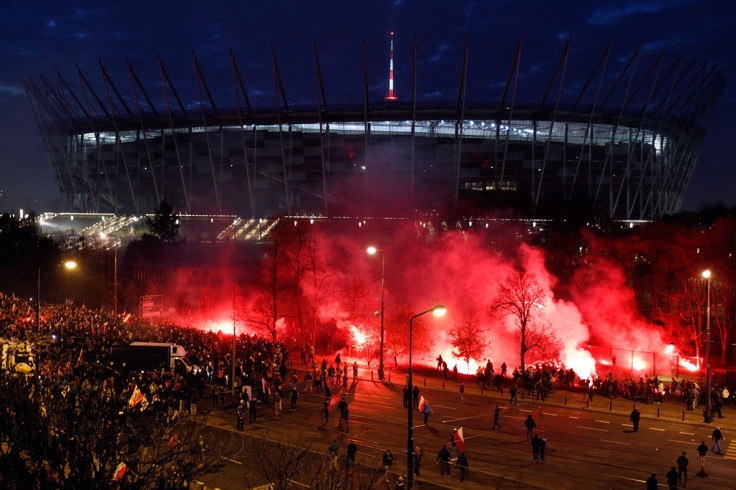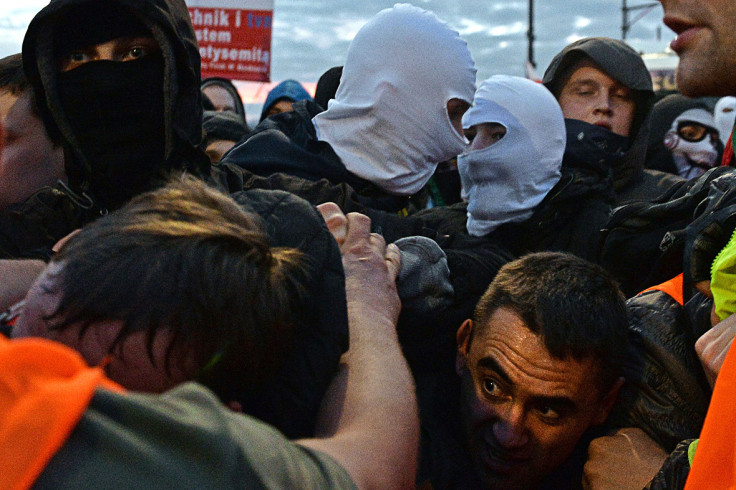The Polish Far-Right Groups Who Plunged Warsaw into Mayhem

Poland's capital Warsaw was plunged into chaos on Thursday, as it has been on every November 11 since 2009, when masked nationalist groups launched red flares and hurled stones at police to mark the country's Independence Day.
Rubber bullets and water cannons returned fire as the authorities struggled to contain the extremist fringe that turned the peaceful march into mayhem. Police said more than 200 people were arrested, many of them before the march, which has been organised by right wing groups, had even started.
In what has become an annual ritual, clashes broke out near the national football stadium. The radical groups tore up paving slabs and benches from a nearby bus station and threw them at police. Three of them attempted to move forward using a large blue road sign but were pushed back, Reuters reported. The rioters were successfully contained, police said later.
Many have expressed concern over what is becoming an odd national tradition geared towards challenging Poland's progress towards European rights and democratic values.
"The march becomes bigger each year," Rafal Pankowski, co-founder of anti-fascist organisation Never Again, told IBTimes UK. "It started as a small fringe event of a few hundred skinheads and now they get about 30,000 people, although the organisation says 100,000."
Since last year, the event has attracted an international audience, with far-right figures mainly from Hungary's Jobbik group, Italy's Forza Nuova and the UK's BNP. The main organisers are two far-right movements called National Radical Group (NR) and Polish Youth, which got together to form the Nationalist Movement's bloc.
Poland for the Polish

With names reminiscent of 1920s and 1930s nationalist movements, the Nationalist Movement propagates an ideology centred around the slogan "Poland for the Polish" preaching hostility towards all minorities and stepping up on homophobic propaganda.
"Many members of these groups are football hooligans and that, along with the extremist ideology, explains the violent component of the Nationalist Movement," explains Pankowski, whose organisation recorded a spike in hate crime in Poland in the last two years.
"Last year we recorded 500 hate crime incidents, including homophobic and racist abuses," he claims, adding that hate crime incidents have increased of the 25% since 2012.
Participants chanted "Down with the European Union" highlighting the extremists' unease towards Poland's acceptance of the continent's union.
The centre-right government "is confused about the reaction", says Pankowski. "They haven't tried to prevent the march. There's a discussion to prohibit it, but it's difficult for them to find a solution".
Earlier in the day, Poland's President Bronislaw Komorowski and his wife Anna attended a smaller march to commemorate the day when Poland regained its place in Europe, after having been removed for 123 years.
The paradox, for Pankowski, is that the huge turnout to the far-right Independence demonstration does not translate into electoral support. At the latest European elections, the Nationalist movement got only the 2% of the vote, while the rival far-right eccentric Congress of New Right -- which made a deal with Nigel Farage's UKIP -- received 7% and four MEPs.
"They stole the electoral potential from the movement, but they are fish in the same water," Pankowski said. "But although they don't get much electoral support, the march shows a dangerous potential."
© Copyright IBTimes 2024. All rights reserved.







